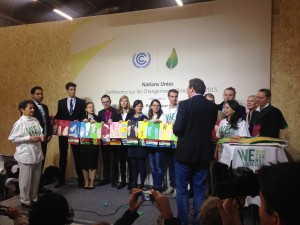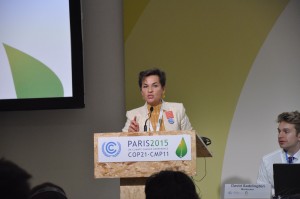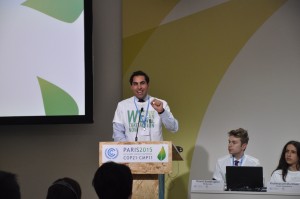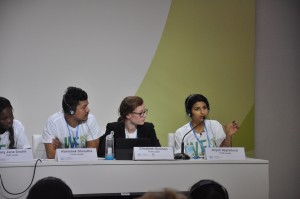By: Sara Velander and Jenna Farineau
Each day at the Conference of Parties, a certain theme is chosen to frame the day’s events and actions, and this past Wednesday, December 4, bore the theme “Young and Future Generations.” Young people were running around expressing their cheery nature, while adults stood in front of them making speeches and while camera-men followed just behind to make sure these moments were captured. How empowering to have a day set aside just for youth in a space where our voices are more often than not suppressed and ignored. Except after the day’s events, we felt quite the opposite. The messages we heard pouring out of the mouths of adults and young people were stale, and frankly, redundant.

Out of the ten youth-related events occurring throughout the day, our delegation for the first week attended two of these: the opening session and the highlight event. At both of the sessions the “revered” UN climate celebrities spoke, also known as Christiana Figueres, the Executive Secretary of the UNFCCC, and Mr. Ahmad Alhendawi, the Secretary-General’s Special Envoy on Youth. You can watch small snippets of some of the day’s speeches in this video. When you watch the video, pay close attention to how many youth voices are included in the compilation in comparison to those of adults.
The opening event featured speeches of the two revered “champions of youth and climate change” that I mentioned earlier that gave their brief, polished speeches in front of a crowd of press, with just a few of us youth watching on the side. The speeches followed with three children around age six, entering the stage to deliver a statement from the ZOOM campaign. They reiterated what has been the stereotypical message for the past 20 years of the ‘environmental children’s movement’, claiming that it is our “last chance to save the planet” and that “kids are fighting to save the world.” Preceding their statements, the three children blew up and popped several balloons, one by one, demonstrating what would happen to a planet with too much CO2. It was quite the visual (and ear-ache).

The highlight event that took place in the afternoon was opened by the founder of Earth Guardians, Xiuhtezcatl Martinez. He is a “15-year old indigenous change agent” that spoke of being on the frontlines for the past nine years and that we need to realize how much climate change is about people and consumer-based lifestyles. He did not allude to the actual problem: corporate control of the global economy and policy. We see him featured at many important events, and his message is always the same: forget about the policy and the money and focus on the people. However, if you truly want to help people by fighting these systematic problems, you need good policy and the right kind of finance to make them a reality.
Xiuhtezcatl’s talk was followed with another expected and seriously disappointing statement from Christiana Figueres, the Executive Secretary of the UNFCCC. She emphasized throughout her speech how it is us, the youth, that carry the responsibility for the future generations and that we need to push this agreement forward through political votes, markets, and transport. It was especially ironic how Christiana spoke about how this transformation from fossil fuels to renewables will not be market-driven when in reality the many mechanisms and “internal systems” the UNFCCC is adopting/supporting are inherently dependent on the market as a solution to the mess developed countries created in the first place. She also spoke about the great threat of climate change that is finally “dawning on all of us as a human society” when we really have been negotiating this for the past 21 years. This is nothing new, and if our “leaders” continue to treat it as such, then we’ll end up having a COP45, most likely halfway underwater.

After Christiana finished her speech and dashed out of the large observer room with her entourage/media on trail, Ahmad Alhendawi gave a speech that was identical to the one given earlier in the morning (with a few minor adjustments). The one solitary message Ahmad reiterates speech after speech is that “no one has the right to gamble with our future,” following the statement with an urgent call for action to negotiators to take a good look at the young faces in the room and realize the need for an ambitious final agreement. My bet is that not a single negotiator for the final agreement attended the highlight event and even considered listening to Ahmad’s dry and cliche speech. We need people like Ahmad who have this position within the UN to stop giving these speeches to the youth, because we get it. It is the people on the inside negotiating our future and the companies fueling our corporate society who generally do not focus their efforts on our important role in these situations.

Anjali Appadurai, a College of the Atlantic and Earth in Bracket’s alum, was the star of the side event, and truly gave us hope. She was supposed to inspire the audience with a story about some amazing changemaking that she has been doing back home – and inspire she did, but in a different way. Figueres gave that booming speech just minutes before Anjali took the stage, but she left immediately after her speech, as you know. Deep concern was voiced by Anjali because Christiana has long championed the youth, but she couldn’t even engage in the remaining 45 minutes that was left for youth voices to actually be heard. Moments like these help us realize just how limiting these spaces are and how much they shape our movements.
As Anjali stressed, we come here from all different kinds of cultures to talk about the issues of climate change and what we can do to fix it, but our voices as youth are often dismissed or dealt with through sarcasm, and perhaps this has led to a greater disconnect. We have been co-opted by the mainstream narratives of business as usual and we’re on track to becoming the same bureaucrats we’re calling out. But despite this feeling of hopelessness, we remember something very powerful that Anjali said: “We need spaces that can cause discomfort for the older generation.” And we need to understand that this is okay. We have the potential to be stronger, and just because we are younger doesn’t mean we can’t put up a fight. It is one thing for adults to tell us that “we have the power,” but it is something entirely different to tell ourselves this.

Perhaps the UNFCCC space is not the right place for authenticity. It is obvious that the objective for the Youth and Future Generations Day is for the media to obscure the views of youth in the UNFCCC space and to send the message that we are a “united” voice on a path for the same kind of change. But in reality, we are a big group of people connected mostly by age and not nearly enough by substance. It’s like saying that all women are feminists because they are women. If you ask a youth from the Global North about their stance on something (i.e. intergenerational equity, historical responsibility), likely someone from the Global South will not always agree. We must work towards finding a middle ground before our movement strays too far.
This youth complex glorifies us in ways that distract from the actual issues that we should be focusing on, such as the broad pre-existing inequities between the developed and developing worlds. Furthermore, days like this one focus so intensely on the recognition and empowerment of youth, but they never go any further or deeper than that. We have reached week 2 of COP21: Is the Secretariat still talking about our presence and all the responsibility that we have? Is she listening to our demands for a 1.5°C world? How can we make our voices heard in such a way that will not be manipulated and sanitized by a space that is meant to provide meaningful coexistence between stakeholders?
As Anjali so strongly stated during her speech: powerful decision-makers like Christiana Figueres should plan to step aside and let youth actually make a meaningful difference at the climate talks. This will challenge us as policy-makers, scientists, educators, and activists. As youth, we should be treated with the respect and maturity we deserve as current and future stakeholders, so that we will be inspired to continue changing the fragmented space of the UNFCCC into one that incorporates a fair and diverse set of views.

I really enjoyed this blog. It was honest, straightforward and eye opening for an adult watching these proceedings from the outside, through various media; none of which, as far as i’ve heard, have given youth the voice they deserve. Earth in Brackets is providing a unique voice and insight. Keep it up!